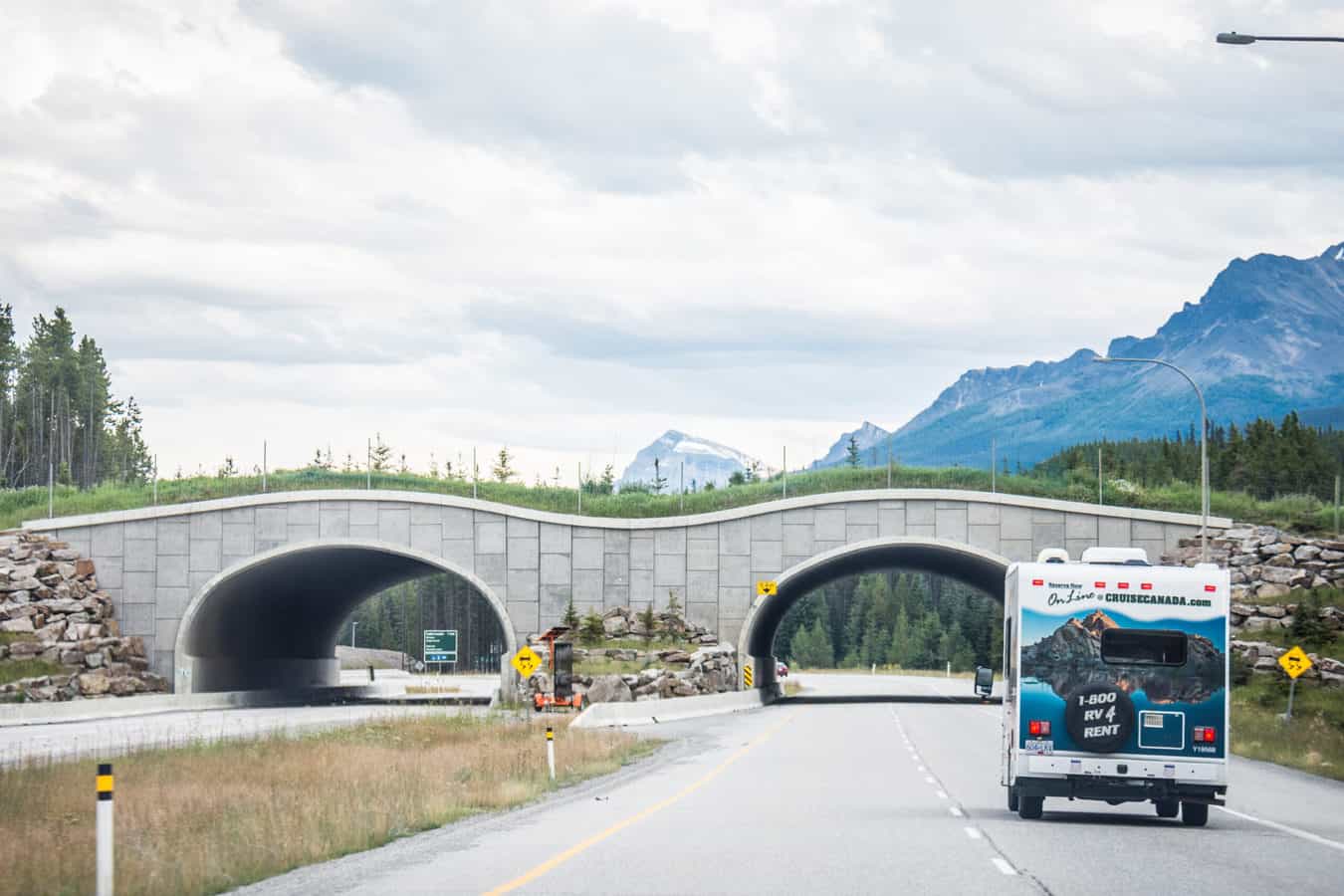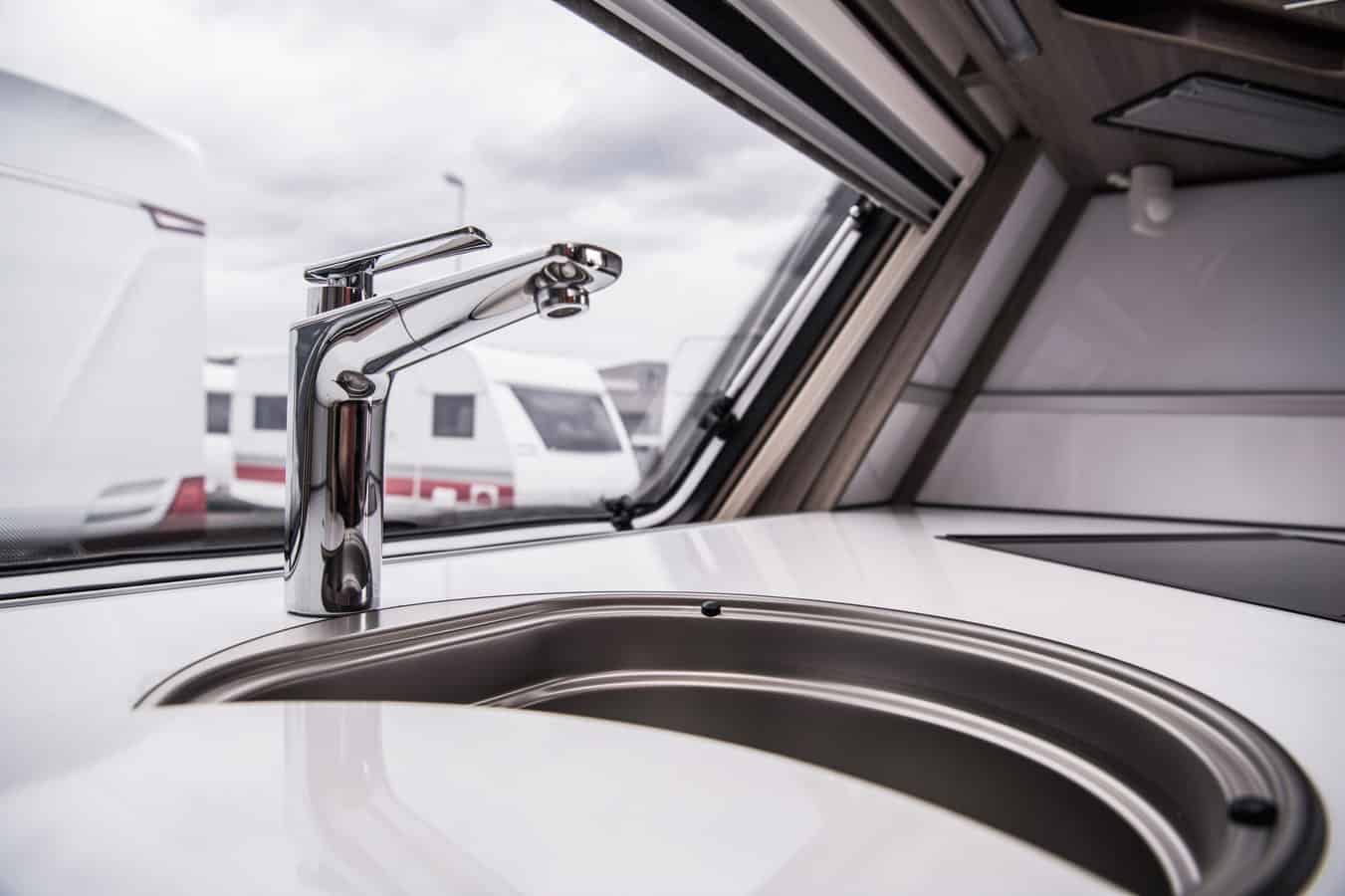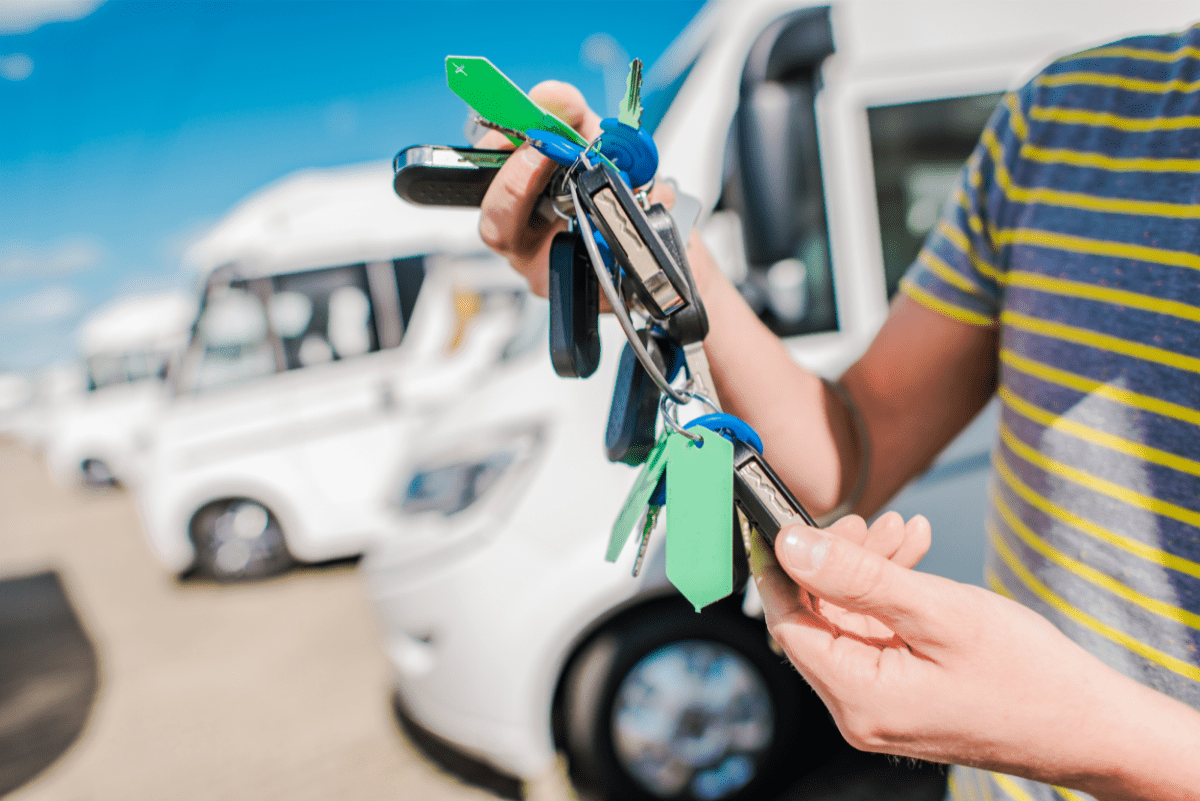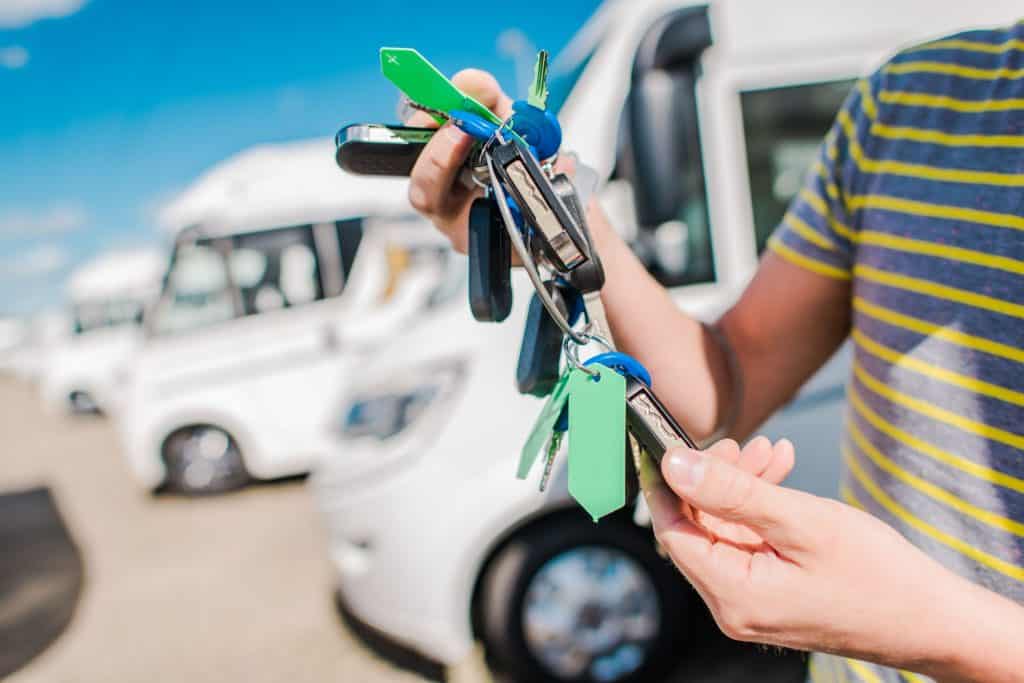
When someone starts looking to buy a travel trailer, the question that always plagues the buyer is whether they should buy a used trailer or a new trailer. Well, I did quite a bit of research and I am here to help you make that choice.
Here is the list of the 16 things you should consider before buying a new or used travel trailer:
- Know Your Budget
- Research Beforehand
- Discounts and Resale Value
- Incentives?
- Advertised Cost vs. Actual Cost
- Financing
- Depreciation
- Age and Owners
- The Unknown
- Lot Rot
- Differences in Construction
- Floor Plans and Features
- National vs. Local Dealerships
- Dealership vs. Private
- What to Inspect When You’re Inspecting
- Taking it Back to the Dealership
1. Know Your Budget
This seems like such an obvious tip, and you might be rolling your eyes right about now, but I promise you that this is the first thing you have to have straight before you can even begin to start looking for RVs and making the choice between new and used travel trailers.
The cost you are willing to pay is going to guide your search, and your price ceiling might end up being the final factor in your choice between new and used travel trailers.
Many websites that sell RVs and travel trailers (really any kind of online store) have the option of filtering you search by price. That way you can only see options in the price range that you’ve set for yourself. This only helps you mentally because that way you don’t have to stare at things that you can’t have.
RV dealerships will also start by asking you what kind of amenities you are looking for, the model you are interested in, and the price you are willing to spend.
Of course, they are going to try their absolute hardest to get you to spend more money, but when you tell them your budget, they can take you to the models that fit within your price range.
2. Research Beforehand

When you know your budget, you can start your research. Make sure to dig deep on your research. Look past just the listed price. See if you can find discounts or deals that will help you and your budget.
The simplest way to start looking for an RV or travel trailer is to search the internet for sites like RV Trader that list all kinds of RVs, campers, motorhomes, buses, and travel trailers that are currently on the market.
These databases list used and new travel trailers, and dealerships will even put their stock on these sites to help draw more traffic (pun intended), so you can even get a sneak peek of what you can expect when you go to a dealership.
Other people are also great resources. Odds are, you probably know somebody who has owned an RV, researched RVs, considered buying an RV, has trolled an RV parking lot, or knows somebody who does.
They have already done half of the work for you, so take advantage of that and pick their brains. Plus, a lot of them are likely older, and old people love to talk (who knows, you might even get free cookies out of it).
If, by some weird twist of circumstance, you don’t live in the vicinity of an RV expert, see if you can find an RV convention or dealership near you that you can do your research on-site at.
The point is that you really need to know your stuff before you start looking at RVs or travel trailers seriously.
You need to know what you want, where to find it, if you can afford it, and what to look for to make sure that you are getting a good deal. You can get stuck with a bad RV or travel trailer otherwise, regardless of whether you bought it used or new.
3. Discounts and Resale Value
At first glance, it does look like buying a new RV is always more expensive than buying a used RV or travel trailer. A lot of the times, that can be the case, but you’ll be surprised how often you can find brand spankn’ new RV’s and travel trailers that sell for less than used ones.
That being said, in general, you can save a lot of money by buying a used RV or travel trailer instead of buying a new one or waiting for the end of the season for a sale to come around.
This is where your budget and your research. really comes in handy. If you know that you can only spend $40,000 on an RV or travel trailer, then you are only going to be looking at RVs or travel trailers in that price range.
Then your research comes into play. Because you were digging deeper than the listed price like I told you to
A new RV or travel trailer that has a listed price at $60,000 might have a discount or a deal that brings it down to around $40,000. The most common deals include:
- Paying in cash
- A large down payment
- Buying an older model
- Being a loyal customer
- Bringing a reference
Any one of these deals, or a combination of a few of these, can easily knock down the price of a new RV or travel trailer to match the price of a used RV or travel trailer.
This means that you could end up driving away a new RV or travel trailer that is still within your price range and a lot more up to date to boot.
The resale value on used travel trailers and RVs rarely comes down because there isn’t really a reason for them to in the dealership’s eyes.
4. Incentives?
Most used travel trailers and RVs are in the lot because they were traded in for a discount on a new RV or travel trailer by a customer. This means that the dealership doesn’t really care about the used RVs and travel trailers. There are also a lot fewer used rigs in RV dealerships.
Given the choice, a dealership will always try to sell you a new RV or travel trailer. Those have the most value to the dealers. There is also a lower demand for used RVs and travel trailers, so nobody is going to be focusing on selling them.
Because of the lack of interest and incentive in selling used travel trailers, the dealerships are not going to offer very good deals on the rigs. They have no reason to because they can get more money by offering a deal or discount on a new RV or travel trailer.
Another downside of the lack of incentive is the subsequent lack of information on used travel trailers. The dealership is not going to “waste” valuable space on displaying the floorplans for the travel trailers or showing the rigs in the most visible spaces.
The sales people are not going to know as much, and that means that you aren’t going to know as much either.
5. Advertised Cost vs. Actual Cost

The advertised cost of an RV or travel trailer is often not the cost that you are going to end up paying. Really, it can go either way; you could end up paying more than the listed price or less than the listed price.
We already talked about how you can end up saving money and paying less than the advertised cost by looking for deals, sales, and discounts. It takes some smart shopping and a whole lot of research, but it’s worth it when you end up spending less than you budgeted.
The other thing we still have to talk about is the hidden costs that are often added to the final price of an RV or travel trailer (or really any vehicle that you buy from a company for that matter).
- Dealership Fees– A dealership will always throw on a few extra hundred dollars under what they term “dealership fees.” Nobody actually knows what those fees are for, but the end result is always an extra couple hundred dollars out of pocket.
- Warranties– Most dealerships will offer warranties for new RVs and travel trailers. They usually last a few years and cover you if and when a system in your rig malfunctions (for some reason, I feel like it’s always the AC unit that does that, right when you need it most).
- Add Ons– You have the option of paying more for these. Dealerships will often offer extra amenities or add ons for a little extra charge. Make sure that you know what you are getting in your RV and what they are trying to add.
- Finance Charges– if you can’t pay for the RV or travel trailer out of pocket (I mean, who can?), then you are going to have to plan out your payments with the dealership. Because of the loan that you’re going to have to get, you are going to have to pay interest, and they are likely going to add on some just because you couldn’t pay it all up front.
When you are buying an RV or travel trailer from a dealership, regardless of if you are buying a new travel trailer or a used one, always make sure that you know exactly how much you are going to end up paying. Be upfront about it and ask a lot of questions.
Used RVs and travel trailers are going to have less additional costs added on to the advertised price (for example, dealerships often will not offer warranties for used rigs), but they have fewer discounts as well. When it comes time for you to make your choice, make sure you are weighing your options properly to get the best rig for the best price.
6. Financing
Most people can’t pay for a car all up front, and they definitely can’t pay for an RV or travel trailer all at once. If you can, then you probably don’t need to be worrying about whether you should buy a new or used and should instead be worrying about what color you’re going to paint your new mansion on wheels.
Many dealerships will offer you a payment plan and a loan to help you buy your vehicle. If you have good credit, you should be fine. They will also offer a warranty most of the time on a vehicle to cover anything that might break soon after you buy the vehicle (usually only for manufacture’s error).
The problem is that dealerships really only want to help finance or warrant new RVs or travel trailers. They don’t see used RVs or travel trailers as a safe investment because they already have wear and tear on them.
Even if they help with loans and a payment plan, you would be hardpressed to find a dealership that offers you a warranty on a used travel trailer.
If you choose to go with a used travel trailer, you might end up having to pay a lot more out of pocket or in cash. This helps the dealership and they might even offer you some help in return if you’re lucky.
7. Depreciation
The biggest depreciation that can happen naturally to any vehicle is when you drive it brand new out of the dealership’s parking lot. Now that the vehicle has an owner, it is not worth as much.
When you buy a new RV or travel trailer, you are the first owner, and that means that the shiny new RV is going to be worthless when the time comes for you to try and sell it yourself.
If you are buying a used RV or travel trailer, that big chunk of depreciation has already happened. That means you can buy it for cheaper and you can sell it at less of a loss (or no loss at all if you cross your fingers).
8. Age and Owners
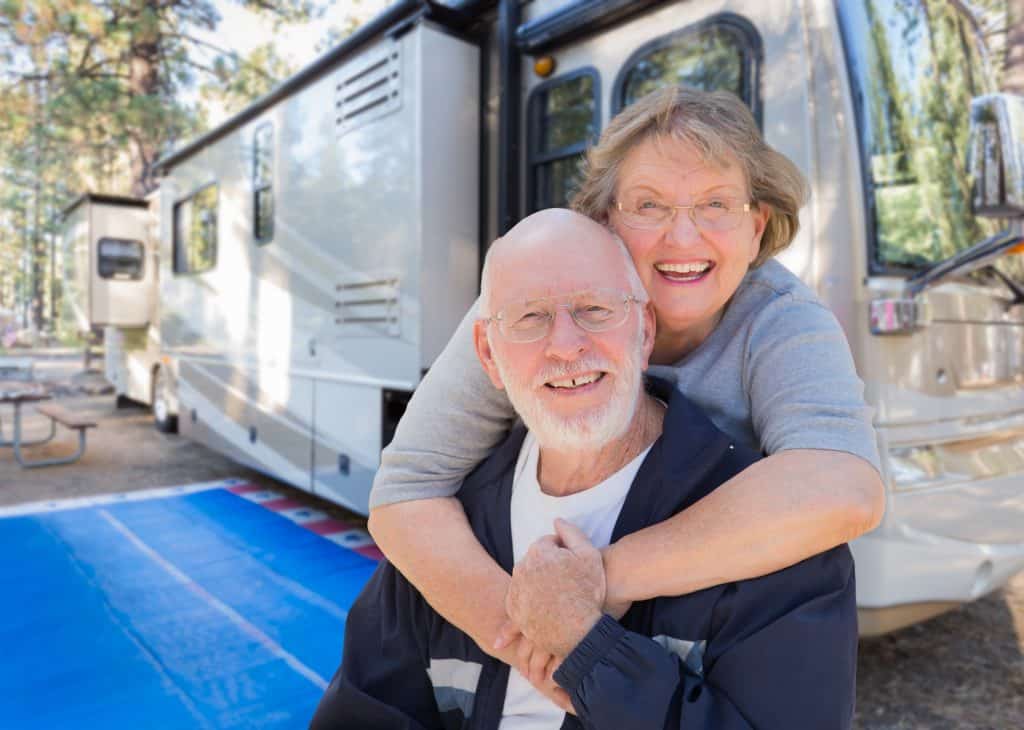
When you buy a new travel trailer or RV, you guarantee that you are the only person who has ever owned that rig. That means you get a new unit complete with that “new car” smell. You are the only person who has ever lived in, used the bathroom in, cooked in, and driven in that RV or travel trailer.
You have complete control over how you are going to treat your new vehicle. Not everybody is as careful as you are, and since you are the only person who has ever owned this rig, you can make sure that you keep your new travel trailer or RV looking really nice and running like new.
When you buy new, you also tend to get newer models with better features, upgraded appliances and parts, and more amenities. While you can still be the first to buy an old model, and you can still buy newer models used, you are going to have more options if you buy new than if you buy used.
When you buy used, you might end up buying a model from a previous owner that smoked. Or maybe the travel trailer has been through a few accidents. Or maybe that rig is super old and has driven too many thousands of miles.
Or maybe there is a ton of water damage. You are always going to have to be more careful when you buy used because the travel trailers you have access to have been through a lot (some of it you might not even find out until you’ve already bought the rig).
Used travel trailers are also older, and with age comes problems. They begin to break down, and even if you saved money on the initial purchase, you might end up spending more on repairs as your older RV starts to break down.
9. The Unknown
This mostly applies to used travel trailers, RVs, motorhomes, and campers (really it applies to all used vehicles), and not to new rigs.
When you buy a new travel trailer, you know exactly what has happened to it since it came off of the assembly line. In fact, you can even find out where each piece of the RV came from before they were even assembled. You know the whole life-story. However, when you buy a used RV, you are never quite sure of what it has been through.
Even if the person selling you the RV tells you as much as they can about their RV, something will get left out. Some private sellers will even intentionally leave information out if they think it will harm the sale of their vehicle.
Damage to the used rig might even be covered up instead of
The bottom line is that you don’t know what a used RV has been through and the kind of repairs you have to do or have been done.
Another issue is that RVs tend to run really well for a few years and then start breaking down (after all, it is an awful lot like dragging around a house on wheels). So the RV might have worked really well for the previous owners, but as soon as you get it, things start breaking down and you end up not saving any money at all in the long run.
A common problem with all travel trailers is that you never really know how many miles are logged on the trailer because trailers don’t have an odometer. Even if the tires have been replaced, there is still wear and tear on the trailer itself.
Little things you might not even think about will start to get wear and tear, and you’ll never be able to know exactly how much wear they have and when you should replace them. Things like:
- Tires
- Shackles
- Nuts
- Axels
- AC units
- Slides
- Cabinet doors
The wear on the AC unit might be more or less than what you might expect depending on the climate the RV lived in and the climate you are going to move it to. Cabinet doors lose their spring and cushioning, and the automated slides can burn out, wear out, or not close properly.
10. Lot Rot
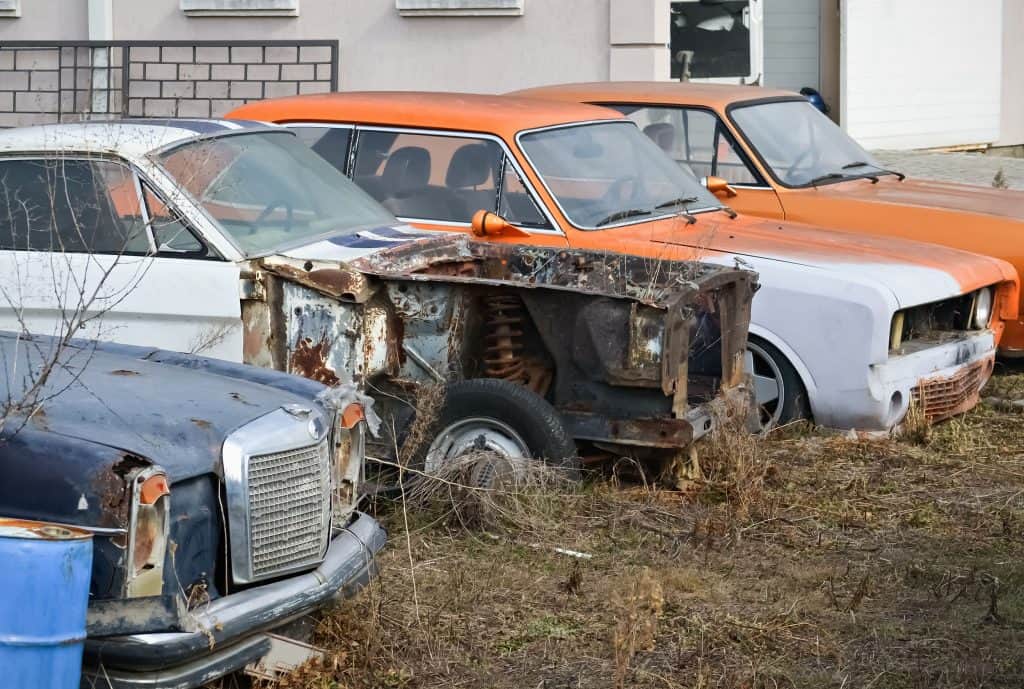
Even if you buy a new travel trailer or RV off of the lot, it is going to have something known as “lot rot.” Lot rot happens when an RV just kind of sits there in the lot for a while.
Nothing truly terrible has happened to it, but simply sitting in the lot and being exposed will start to do a little bit of a number on the rig.
One of the biggest things you’ll have to look out for is the condition of the battery. Batteries should be kept charged at above 50% and they should never be run for an extended amount of time when they are below 50%. You should never run a vehicle battery dead.
The problem is that when models sit in the lot to be shown to potential buyers, the battery is often left running (lights left on usually), and you’d better bet that they run it even when it’s below 50%.
Most of the batteries in the models in the lots get run dead and then they don’t get charged for days.
When you buy an RV or travel trailer from the lot (whether a used one or a new one), always ask for a new house battery. You have a good chance of the dealership throwing one in at no cost or at a steep discount.
Another big thing to look out for is the age of the tires on the model you buy. Tires age out before they wear out. Because RVs and travel trailers are put together on an assembly line piece by piece and then delivered around the world, your rig is already a few months old by the time you get it and your tires might already be six to nine months old.
Check the DOT date on the tire when you are looking at a model to purchase (it’s written right on the tire). If you buy an RV that is fresh from the assembly line, your DOT date will be within a month or two.
If you do want to buy new tires, the dealership might give you a discount on new tires when you purchase an RV or travel trailer from them.
Of course, when the model is just sitting out there in the weather, there is going to be some wear and tear. You are going to have to make sure that there is no water damage and that the exterior is still in good condition. Check for leaks around where the slides go in and out of the rig and around the entrances.
11. Differences in Construction
When you buy a new RV or travel trailer, you are going to get a very different model from the one you currently have. The newer models of RVs and travel trailers have been shaking things up and changing the floor plans quite a bit every time they release a new model.
They also change the construction of the model based on customer feedback, always trying to change it for the better.
Newer years of RVs have more amenities and better, up to date, features. Used travel trailers and RVs, for obvious reasons, are missing that modern quality.
In fact, used RVs, because they were usually built years ago, have basically the same construction between different models. Because they are typically older RVs, the companies hadn’t gotten around to being so quick to change their construction.
So if you’re just looking for an RV that is basically the same as yours but in better condition, then try finding somebody with the same RV as you that took better care of it and is willing to sell it to you.
12. Floor Plans and Features
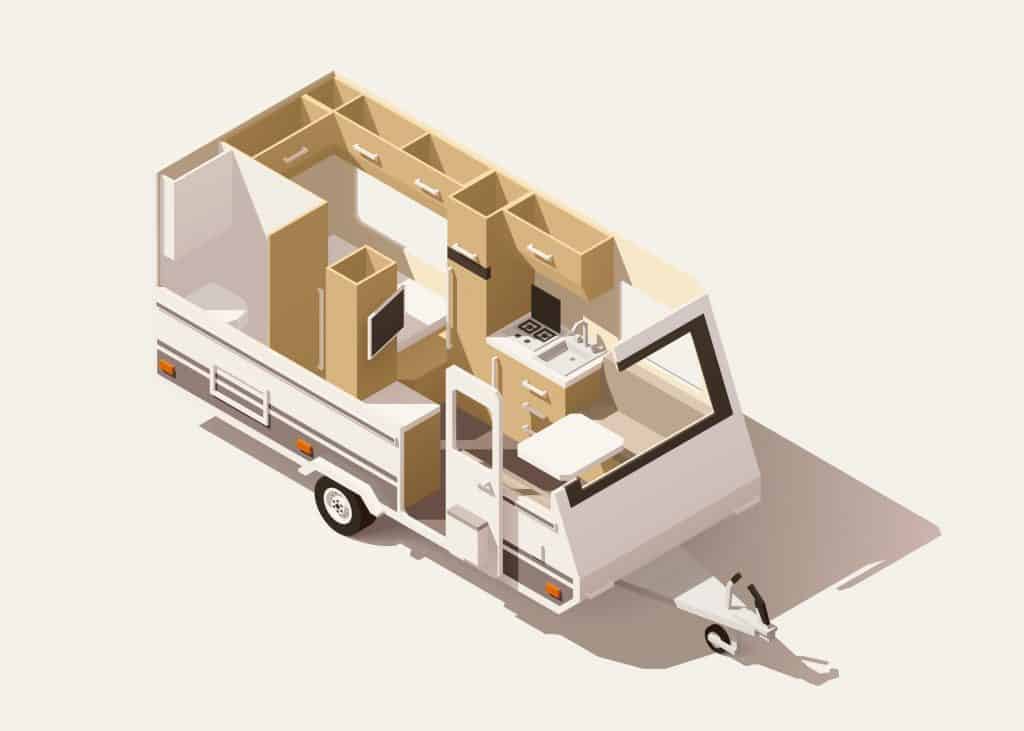
This is very closely related to the idea that the construction of new RVs and travel trailers are different between models while the construction on used RVs is often the same between models.
New RVs and travel trailers have more options that used ones do simply because they are new. For example, you would be hard pressed to find an older, used RV or travel trailer that had slides.
Some older travel trailers also don’t have anywhere for you to install a TV or microwave.
Some things in travel trailer are easily upgradable, like toilets and seat cushions. If you get a new enough used travel trailer, you even have the option of upgrading the TV model. Don’t make these things deal-breakers when you are looking to buy a travel trailer.
However, there are also a lot of things in travel trailers that you can’t upgrade very easily. Be on the lookout for parts that are impossible to replace or out of date.
Older used RVs will have some things that need replacing, and you have to make sure that they are still current enough to have replacement parts you can order online.
Basically, the idea is that if you buy a new RV or travel trailer, you have more floor plan options and things are more modern. If stuff breaks, you can easily access the parts to fix it.
If you buy a used RV or travel trailer, you will have fewer options, and you might have some out of date parts that are extremely difficult to find replacements for.
13. Local vs. National Dealerships
National RV dealerships are often much cheaper than your local dealerships. They are often huge lots and have popular and prestigious RV models. The top ten national dealerships include (find the full article here):
- Affinity RV Service
- Bill Plemmons RV World
- Curtis Trailers
- Guaranty RV
- Hartville RV Center
- Mount Comfort RV
- Princess Craft
- United RV Center
- Veurinks’ RV Center
- Walnut Ridge Family RV Sales
Even though national RV dealerships are often cheaper, many people sill chose to go to a local dealer because they are closer and allow you to show your loyalty for your community.
At a national RV dealership, you will find a lot of variety, but you won’t really find people who are willing to negotiate on prices. You can also use the national dealerships as a template to continue your shopping and help with your research.
If you chose to go with a local dealer, they will have more used RVs than a national RV dealership will have. There will also be more local dealers near you than national dealerships. Local dealerships are smaller and have less variety, but they are more will to negotiate on prices and deals.
14. Dealership vs. Private
You can either go to a dealership in your area to buy an RV or travel trailer, or you can go to a private person selling their vehicle.
If you chose to go with a private sale, you have quite a few options. A lot of people will post the RV or travel trailer that they want to sell on sites online.
A big website for selling RVs is called RV Trader. They post new and used rigs, and some dealerships even post their stock there. You can find RVs for sale all across the country for cheaper (usually) than you would find at a dealership near you.
If you want to go even cheaper, you can try a Craigslist search for used RVs near you. People wanting to sell on Craigslist are likely selling used rigs, and quite a few of them are probably going to be fixer-uppers. If you want a cheap RV to remodel and make your own, then Craiglist might be the way to go.
A benefit of buying new RVs and travel trailers through sites like RV Traders is that the models listed haven’t been shown as much, so they are in better condition. However, if you do choose to go through a private site, you have less of a guarantee that what you see is actually what you are getting. So you are going to have to be careful.
RV dealerships have more options and more amenities, but you might not end up getting the exact model that you want. You can’t really walk into the dealership and request the model and the amenities and the price that you want. They simply might not have that on the lot.
You can make a custom order online through the dealership’s website. That is much more expensive, but you get exactly what you want, and you get it right off of the assembly line (no lot rot).
If you go through a private seller, you have a bigger chance of making a deal. If you’ve ever bought anything on Craigslist, you know that you can haggle down the price usually at least a thousand dollars.
You can also search for exactly what you want and odds are you are going to be able to find exactly that somewhere in the U.S. However, if you go the private route, you won’t be able to make custom orders.
15. What to Inspect When You’re Inspecting
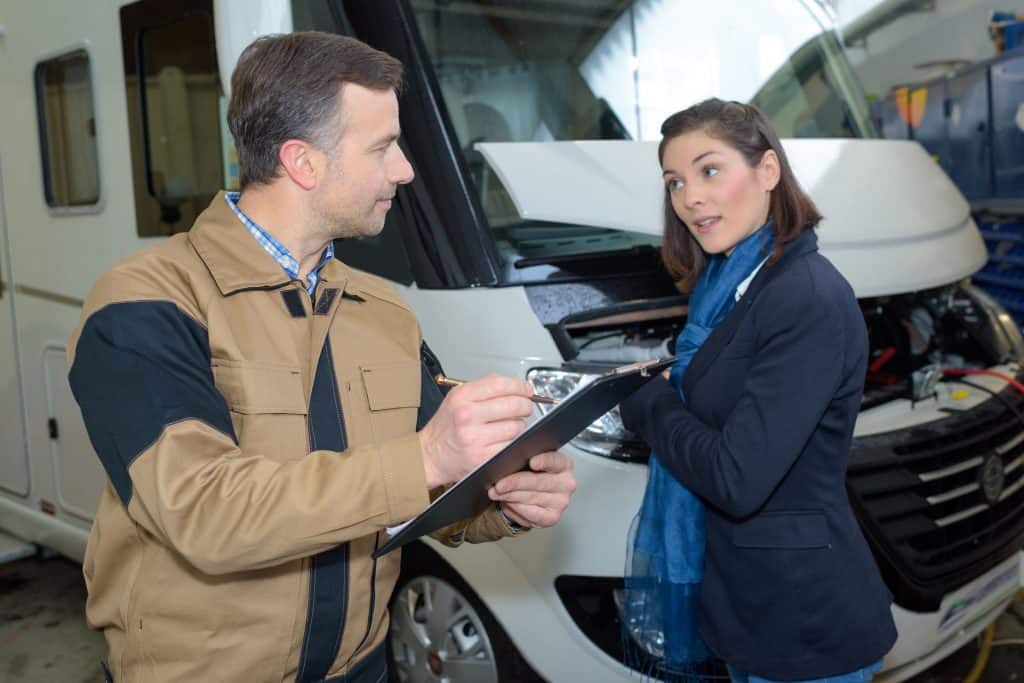
Both new and used travel trailers are going to have problems, and you need to know what to inspect to make sure that you get the most bang for your buck.
Usually, used RVs will need quite a bit fixed because they are older. The previous owners might have had to fix things as well. Make sure you know what repairs have been made and make sure that they have been repaired well. You might have to redo the repair.
A lot of this you might be able to get the dealership to fix before you drive it off of the lot if you catch it before you buy it.
- Gaps in Seals and Trim– trim that has started to peel away from the wall can be fixed with liquid nails or tacks. You can have the dealership fix it if caught it while it was still in the lot before you buy it. If you’ve already brought it home, you just fix it yourself, because it’s pretty simple.
- Water Damage– check especially around where the carpet transitions to tile or where it meets the wall, check the corners of the RV and check around the slides. Make sure that the seal around the slides sits flat against the wall when the slide is retracted. If it hasn’t rained in a while, you can spray the RV with a water hose to check for leaks (don’t use a high-pressure nozzle, because you can still force water in that way).
- Constant Water Flow– if the water coming from your sink faucet or shower nozzle spurts or is inconsistent, that might mean that you have water in the line. Sometimes you can just wait until the system purges itself of the air and the stream begins to run consistently, but you should fix it. You could do it yourself, but it is a little tricky, so I would recommend that you get some help.
- Fridge and Stove/Oven– the fridge may take a while to cool because of the model (and depending on if the rig is level). The stove might take a while to light if you have to purge the air from the system. If the stove won’t light, let the gas run for about 20 seconds and then try it again.
- Cabinets Stay Closed– they could shift because driving will put stress on parts that are supposed to be rigid. You can fix yourself by removing the screws, repositioning the door, and then screwing it back in.
- AC– ducts run a certain way, so if you turn some of the vents a certain way, you will not get consistent air flow. Check to make sure that you have the vents in the right places so you can get good airflow where you want it. The problem vent is usually the one closest to the AC unit because the air pressure will make the cold air skip right over the vent if it is angled the wrong way.
- Light Switches– look for flickering, delays, and things that don’t work. That means you have a pinched wire somewhere. That can cause a short or a ground, which can be dangerous and lead to electrical problems. You should probably get them fixed by a professional. Fix it immediately.
You shouldn’t worry so much about the small stuff you have to fix. Every RV is going to have problems. See what you can fix yourself and get the rest taken care of as soon as possible.
16. Taking it Back to the Dealership
You are going to want to get a good RV right off the bat, whether you decide to get a used or new RV if you decide to buy one from a dealership.
If something is wrong with your RV and you want to take it back to the dealership to have them take a look at it, you need to know this very important fact:
It will take forever to get your RV back!
Even if your travel trailer or RV is all fixed, it might be blocked in, meaning you can’t get it back until the RV blocking it leaves too. Or you might not get your RV back for a while because the might be waiting for a part.
Once you hand over your RV you are not going to be able to take it out early if it’s not fixed because the company does not want to be liable for letting you drive in a vehicle they saw was broken.
If you buy an RV from a private seller, you can take your travel trailer or RV to a dealership to get fixed, but it is going to be more expensive, and they might not even take it.
Used RVs and travel trailers usually have more that could go wrong and have more to fix. This means that you might have to take it to the dealership more often. That takes away time from you
Basically, you do not want to have to take your RV or travel back to the dealership to get it fixed. Buying a new travel trailer increases your chances of keeping your rig out of the dealership.
Related Questions
Do RVs hold their value? Like all vehicles, RVs and travel trailers will depreciate over time, no matter what you do (unless you are restoring an RV). RVs do remain valuable for longer than other vehicles, and cheaper RVs depreciate faster.
How much is an RV inspection? You might want to get an RV inspection if you are selling or buying a used RV. Depending on the kind of RV you want inspected and the kind of inspection you want, it can cost anywhere from $250 to $1200.

